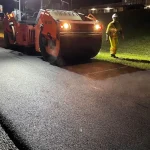
🧪 Polymer Modified Bitumen (PMB): Its Uses, Applications, and Benefits
Polymer Modified Bitumen (PMB) is a specialized form of bitumen that has been enhanced with the addition of polymers to improve its performance. This advanced material provides superior elasticity, durability, and resistance to deformation, making it a preferred choice in high-stress and temperature-variable applications. PMB is widely used in modern construction, especially in highway paving, waterproofing systems, and roofing.
In this comprehensive guide, we’ll explain what PMB is, its industrial uses, and the benefits it offers to contractors, governments, and infrastructure developers.
What is Polymer Modified Bitumen?
Polymer Modified Bitumen is standard bitumen that has been chemically modified with polymers such as SBS (Styrene-Butadiene-Styrene) or APP (Atactic Polypropylene). These additives alter the molecular structure of bitumen, giving it greater elasticity, tensile strength, and temperature resistance.
🧬 Common Types of PMB:
-
SBS-Modified Bitumen: Provides rubber-like properties for flexibility and fatigue resistance.
-
APP-Modified Bitumen: Enhances thermal resistance and aging performance.
These polymers, which can include styrene-butadiene-styrene (SBS), styrene-butadiene rubber (SBR), and ethylene-vinyl acetate (EVA), are blended with bitumen to improve its elasticity, flexibility, and resistance to deformation. The resulting PMB exhibits superior properties compared to conventional bitumen, making it an ideal choice for demanding pavement applications.
Key Properties of Polymer Modified Bitumen (PMB)
Polymer Modified Bitumen (PMB) boasts a range of key properties that set it apart from traditional bitumen:
Enhanced Flexibility: The addition of polymers improves the flexibility and elasticity of bitumen, allowing PMB to withstand deformation and fatigue caused by traffic loads and temperature fluctuations.
Improved Aging Resistance: PMB exhibits enhanced resistance to aging and oxidation, resulting in longer-lasting pavements with reduced maintenance requirements and lifecycle costs.
Superior Rutting Resistance: The superior stiffness and modulus of PMB make it highly resistant to rutting, even under heavy traffic loads and high temperatures.
Crack Resistance: PMB forms a more cohesive and durable asphalt binder, reducing the risk of cracking and fatigue damage in pavements subjected to repeated loading and thermal cycling.
🏗️ Industrial Applications of Polymer Modified Bitumen
1. Asphalt Mixtures
Polymer Modified Bitumen (PMB) is commonly used as a binder in asphalt mixtures for various road construction applications, including:
Surface Courses: PMB is used in surface courses of flexible pavements to provide superior resistance to rutting, cracking, and aging, ensuring long-term pavement performance and durability.
Binder Courses: In binder courses, PMB improves the fatigue resistance and thermal stability of asphalt mixes, prolonging the service life of pavements subjected to heavy traffic and harsh environmental conditions.
Thin Overlays: PMB-based thin overlays offer a cost-effective solution for pavement preservation and rehabilitation, providing a durable wearing surface that resists rutting and extends pavement life.
2. Pavement Rehabilitation
Polymer Modified Bitumen (PMB) is also used in pavement rehabilitation projects to enhance the performance and longevity of existing pavements:
Crack Sealing: PMB-based crack sealants are used to fill and seal cracks in asphalt pavements, preventing moisture infiltration and inhibiting further deterioration of the pavement structure.
Overlay Construction: PMB is employed in overlay construction projects to improve the bonding between new and existing pavement layers, reducing the risk of delamination and reflective cracking.
3. Specialized Applications
Beyond traditional road construction, Polymer Modified Bitumen (PMB) finds applications in specialized pavement projects and infrastructure developments:
Airport Pavements: PMB is used in the construction of airport runways and taxiways, where high traffic volumes and heavy aircraft loads necessitate superior pavement performance and durability.
High-Performance Pavements: In high-performance pavement applications, such as racetracks and industrial facilities, PMB offers exceptional durability and resistance to wear and tear.
🏗️ Industrial Polymer Modified Bitumen Usages
🛣️ Highway Construction & Paving
PMB is extensively used in the construction of high-performance roads, motorways, and airport runways. It resists rutting and cracking, especially in regions with high traffic loads or extreme climates.
🧱 Waterproofing Membranes
In roofing and structural waterproofing, PMB is used in bituminous membranes to provide elasticity and durability, especially on bridges, tunnels, and buildings.
🛤️ Railway Track Bed Stabilization
It improves the resilience of the track structure by reducing vibration, settlement, and water penetration, making it ideal for heavy rail infrastructure.
🏢 Industrial Flooring
PMB-based mastic asphalt is used for industrial-grade floors requiring resistance to wear, chemicals, and heat—common in warehouses, factories, and production facilities.
🛢️ Tank and Pipeline Coating
Its adhesive and chemical-resistant properties make it ideal for anti-corrosive coatings in storage tanks and buried pipelines.
📊 Benefits of Polymer Modified Bitumen
💪 Improved Durability
PMB performs well under mechanical stress and temperature fluctuations, significantly extending the life of roads and structures.
🌡️ Wider Temperature Range
It remains flexible in cold climates and resists softening in hot conditions—ideal for climatic extremes.
🚧 Better Resistance to Rutting and Cracking
Unlike traditional bitumen, PMB retains structural integrity under high traffic loads and repeated deformation.
💧 Enhanced Water Resistance
Its dense structure provides superior resistance to water penetration, reducing the risk of pavement damage and corrosion.
🛠️ Versatility in Applications
PMB is suitable for both flexible pavement structures and structural waterproofing systems, making it a cost-effective, multipurpose solution.
Polymer Modified Bitumen (PMB) offers a multitude of benefits compared to conventional bitumen:
- Enhanced Durability: PMB’s superior properties result in longer-lasting pavements with reduced maintenance requirements, leading to significant cost savings over the pavement’s lifecycle.
- Improved Pavement Performance: PMB enhances pavement performance by providing superior resistance to rutting, cracking, and fatigue, even under challenging environmental and traffic conditions.
- Extended Service Life: Pavements constructed with PMB exhibit enhanced durability and resistance to aging, resulting in extended service life and improved overall pavement performance.
- Sustainable Solution: PMB-based pavements require less frequent maintenance and rehabilitation, reducing the environmental impact and carbon footprint associated with pavement construction and maintenance activities.
🔍 Technical Comparison Table
| Property | Conventional Bitumen | Polymer Modified Bitumen |
|---|---|---|
| Elastic Recovery | Low | High |
| Temperature Susceptibility | High | Low |
| Rutting Resistance | Moderate | Excellent |
| Crack Resistance | Poor | High |
| Aging Resistance | Moderate | Excellent |
| Fatigue Life | Limited | Long-lasting |
✅ Value to Industrial Users
-
📉 Reduced Maintenance Costs – Fewer repairs due to rutting and cracking
-
🔄 Longer Pavement Life – Improved fatigue and aging performance
-
🏗️ Higher Load Capacity – Ideal for airports, highways, and industrial zones
-
🧰 Customizable Performance – Tailored formulations to meet project-specific needs
❓ FAQs about Benefits of Polymer Modified Bitumen
🧪 What is the main purpose of Polymer Modified Bitumen?
It enhances the elasticity, durability, and weather resistance of conventional bitumen for improved performance in high-stress environments.
🛣️ Why is PMB preferred in road construction?
Because it resists rutting, cracking, and fatigue better than standard bitumen, especially under heavy traffic and extreme temperatures.
🌧️ Is PMB waterproof?
Yes, its dense structure and polymer content offer excellent water resistance, making it suitable for waterproofing applications.
🏗️ Can PMB be used for bridge decks and tunnels?
Absolutely. PMB is commonly used in waterproofing membranes for bridge decks, tunnels, and substructures due to its elasticity and durability.
🔬 What are the most common polymers used in PMB?
The two most common are SBS (Styrene-Butadiene-Styrene) and APP (Atactic Polypropylene).
🧾 Conclusion- Benefits of Polymer Modified Bitumen
Polymer Modified Bitumen (PMB) stands at the forefront of innovation in the field of road construction materials, offering unmatched durability, performance, and sustainability.
With its enhanced properties and diverse applications, PMB has transformed the way we design, build, and maintain pavements, ensuring safer, smoother, and more resilient transportation infrastructure for generations to come.
As the demand for high-performance pavements continues to grow, Polymer Modified Bitumen (PMB) remains a trusted and reliable solution for meeting the challenges of modern infrastructure development.
Embrace the power of PMB and experience the difference it can make in creating durable, sustainable, and cost-effective pavements that stand the test of time.
📞 Call to Peak Universal Business
🔍 Looking for a dependable supplier of Polymer Modified Bitumen?
We can help you with:
-
📄 Custom PMB formulations
-
🚛 Bulk delivery across global markets
-
📊 Technical data sheets and support
🔹 Request a Quote | 🔹 Download TDS | 🔹 Talk to a Bitumen Specialist
📧 Email: [email protected]
📞 Phone: +971 4 878 2031
🌐 Visit: PUBLtd.Bitumens
📦 Bulk Supply & RAP Integration Options Available
If You have any other Query or Question you want to ask, Please don’t hesitate to Contact Us.
- 0 comment





Leave a Reply